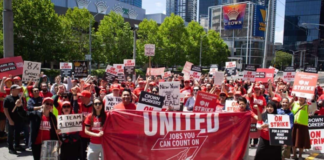Under the cover of the pandemic, India’s hard right Prime Minister Narendra Modi has passed new laws which farmers describe as “Kaale Kanoon”—laws which bring darkness. A huge farmers’ protest involving more than 100,000 tractors and farm vehicles broke into the capital, Delhi, in late January.
The Modi government wants to increase privatisation through neo-liberal policies that would benefit big corporations.
Agricultural reforms in the 1960s saw the government regulate all large wholesale markets in order to track produce, estimate food availability and ensure farmers were paid stable and reasonable prices.
This was accompanied by a minimum support price (MSP) for farmers in key crops. Theoretically, this was the floor price at which the government would buy the farmers’ produce if they could not find better rates in the open market.
However, before these new farming laws, only paddy (unthreshed rice) and wheat were procured by government agencies, along with some amount of cotton, oilseeds and few pulses. For the remaining crops, there was hardly any procurement at MSP rates. So farmers ended up selling most of their produce below government-mandated prices.
Farmers in India were already struggling. Between 2018 and 2019, 20,000 farmers committed suicide.
The agriculture laws have been strongly criticised by farmer unions. Sixty per cent of India’s population of 1.4 billion is directly involved in the farming sector.
Previously, traders were allowed to store essential produce only up to a fixed limit. The Modi government wants to remove that limit and allow traders to stock as much as they can.
This would benefit corporations like Reliance, Adani, and Walmart, allowing them to hoard produce and control prices.
Corporations would also gain permission to buy directly from farmers at market prices. They would compete with the existing government-controlled markets where farmers sell their produce at the fixed price.
This model has already been introduced in some areas. In 2016, the state of Bihar introduced an open market system. Farmers were forced to sell their produce at lower prices and, as a result, farmers there have the lowest incomes in the country. Farmers in Punjab and Haryana, where government-run markets still exist, have the highest incomes.
Finally, the laws establish a framework to expand contract farming, where farmers agree to produce particular crops for direct sale to agribusiness companies. Farmers would lose the right to go to court in the case of any dispute, with new dispute resolution bodies to handle complaints.
This system of contract farming was previously introduced in some parts of Punjab and Maharashtra, and saw farmers face big losses. There were cases where farmers signed a contract with a private company, which then threatened not to buy their produce after it was grown, resulting in them having to sell for a very low price.
Mass protests
Farmers started organising in Punjab, holding protests that stopped train services. But the government ignored them. So they decided to make themselves heard by going to Delhi.
In November, thousands of farmers took their tractors to the city. Police did everything to stop them from reaching it, using water cannons and tear gas grenades as well as digging trenches on the national highways. But all this failed.
After seeing the large numbers and immense dedication of the farmers, the police retreated, and farmers set up camp outside Delhi. The same day they arrived, 250 million workers went on strike against the Modi government.
Thousands blocked all five highways connecting Delhi to other parts of India. Initially, the government thought they would go back to their villages within a few days. But the farmers came fully prepared, with kitchen equipment, makeshift libraries and schools, medicine and health check-up camps, signalling that they were not going anywhere until the laws were reversed.
The farmers announced plans to march into Delhi on 26 January, prompting the Supreme Court to suspend the laws for one and a half years. This clearly showed the impact of the protests.
Farmers refused the Supreme Court’s offer and began their march into Delhi, smashing through police barricades with tractors.
Modi’s government has tried to spread division by claiming the farmers are Sikh terrorists or traitors who are funded by Pakistan and China. But the farmers continue to have strong community support across religions and castes. Nearby villages have donated huge quantities of fruit, vegetables and milk to the protesting farmers each day.
This is hugely significant given Modi’s record of using ultra-nationalism and anti-Muslim policies to build his support. He has passed laws that threaten to strip Muslims of their citizenship and encouraged anti-Muslim pogroms. The farmers’ incredible resistance is showing how to fight back when governments try to make workers and the poor pay.
By Aman Kapoor





